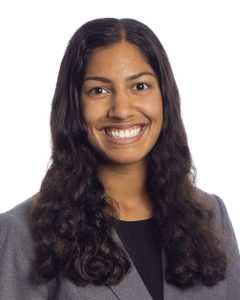Community Service
Foster Service Corps student consulting teams provide business intelligence for Seattle neighborhood chamber of commerce
An ambitious plan to transition an area of prime but underutilized real estate into a “green belt” of next-generation environmentally friendly businesses. A technology-driven consumer loyalty program that spans a dozen industries.
These types of major initiatives typically would be the product of a costly government program or a high-powered consulting firm. Instead they came from a partnership between the Magnolia Chamber of Commerce in Seattle and the University of Washington Foster School of Business Service Corps program.
Since 2019, teams of Foster MBA students have collaborated with the chamber on a variety of programs to boost businesses in the neighborhood while also serving the residents of the community. The chamber benefits from the fresh ideas, work ethic and research skills of the MBA students, who, in turn, get real-world consulting experience and an opportunity to tackle pressing business issues.
Despite the added challenge of a pandemic, this year’s two projects were particularly formidable.
Envisioning an industrial “green belt”
 Travis Strawn (MBA 2022) was part of a team tasked with exploring opportunities for parcels of land near Fishermen’s Terminal that today houses decommissioned military equipment, warehouses, maritime industry companies and other businesses. “The chamber has a vision of creating a corridor consisting of green-tech companies and those in the maritime industry focused on sustainability.” Strawn says. “They wanted strategic thoughts around how to best organize this effort.”
Travis Strawn (MBA 2022) was part of a team tasked with exploring opportunities for parcels of land near Fishermen’s Terminal that today houses decommissioned military equipment, warehouses, maritime industry companies and other businesses. “The chamber has a vision of creating a corridor consisting of green-tech companies and those in the maritime industry focused on sustainability.” Strawn says. “They wanted strategic thoughts around how to best organize this effort.”
Strawn says the team started with determining how they could “best advise the chamber on creating this vision … do we market this area to individual businesses or to the sector overall? What types of conversations need to be had, and organizations brought in? Who should be the key targets?”
To do so, the team evaluated the efforts already underway, met with numerous stakeholders, and examined similar efforts in other cities. Their ultimate deliverable was a presentation including immediate action items within the chamber’s current purview, identifying which partnerships would be most beneficial for the next phase of the project, and an outreach strategy.

Strawn welcomed the chance to work on an assignment with a complex set of considerations, including the chamber not owning the land directly, wedding the interests of public and private entities, and a limited time frame, as the project lasted 10 weeks overall.
“It was an interesting exercise in scope management, because this is something that could become a massive endeavor,” he says. “We had to define our deliverables and turn ideas into action items. One of the great learning points for me was navigating having a client with an ambitious goal and limited resources, and evaluating how to best bridge that and deliver something useful and actionable for them.”
Loyalty program: effective or not?
The second team of Foster MBA students examined loyalty program strategies for Magnolia businesses. The chamber was exploring launching a single combined loyalty program spanning multiple businesses in Magnolia.

The team did a deep dive on loyalty programs overall and interviewed owners of local businesses to evaluate how this might work. Ultimately, they concluded such a program was not a viable solution. “It wasn’t what we expected,” says Robbie Lane (MBA 2021). “We all thought, ‘Oh, we’ll find a great loyalty program solution for the neighborhood.’ ”
But as the team reviewed options, it became evident that a restaurant had a very different set of requirements and expectations from a loyalty program than that of a retailer or a service provider.

The conclusion was unanimous among the team. “We did quite a thorough review of different types of loyalty program,” says Eashita Ratwani (MBA 2021). “We recommended not pursuing a consolidated neighborhood loyalty program because it’s not necessarily one type of customer that goes to Magnolia. And there isn’t a loyalty program that would make them want to go to all of the different businesses. We didn’t find that to be the best use of resources for the chamber to achieve the goal of increasing foot traffic to the neighborhood.”
With those interviews came insights into what would make for an effective loyalty program for specific business. “It’s vital to be open to unexpected outcomes and being willing to pivot,” Lane says. “For our team, that was recognizing that we’ve done very valuable research and could create resources that are helpful for the chamber to better understand their business space.”
That work has been assembled into a resource guide that the chamber has made available to its members on its website.
A community asset
“I think the Foster program is a great asset,” chamber president Daniela Eng says. “It is very much a two-sided partnership. To start, the Foster students listened and took information from us, then provided input themselves.”

That partnership is slated to continue with new projects in the coming years. And all the participants highly recommend future Foster students make every effort to get involved.
“Having a program where MBA students are encouraged to go out and help local businesses plus contribute directly to the community is very important,” says Neesha Pinnaduwage (MBA 2021). “We aren’t just staying on campus. We are making a community connection and giving back in a way beyond just getting the degree. So, to me it was great to learn more about the community and work with some really awesome people along the way.”
